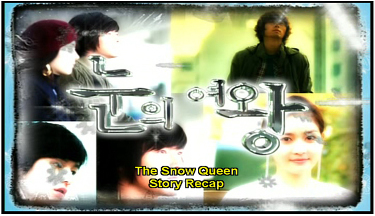NEW CONTEST FOR A FREE EDITION! SEE HERE
The Snow Queen
Directed by Yoon Suk Ho
Written by Kim Yoon Hee, Yoon Eun Kyung
Originally aired in Korea KBS2
November 13, 2006 to January 8, 2007
|
|
Thinking of buying from YesAsia? CLICK HERE and use THIS UPDATED BEAVER PAGE to source their very best... |
|
Cast:
Hyeon Bin as Han Tae Woong
Sung Yu Ri as Kim Bo Ra
Im Ju Hwan as Suh Gun Woo
Yoo In Young as Lee Seoung Ri
Kim Tae Hyun as Choi Choong Shik
Ho Jin as Kim Jang Su (Bo Ra's father)
Go Doo Shim as Park Teong Ok (Tae Woong's mother)
Lee Sun Ho as Kim Jeong Kyu
Go Ju Yun as Kim Bo Ra (at 14)
Review by Leonard Norwitz
Studio:
Production: Yoonscolor (Korea)
Video: YA Entertainment (USA)
Video:
Aspect ratio: 16:6 Anamorphic
Region 1: NTSC
Feature: 480i
Supplements: 480i
Audio:
Korean DD2.0
Subtitles:
Feature: English
Extras: English
Extras:
• Behind the Scenes
• Highlights
• Music Videos
Presentation
16 episodes, approx. 1 hour/episode
Extra features: 1 hour + stills
1 box set, gatefold, complete on 6 discs
Release Date: November 6, 2007
The Snow Queen ~ A Commentary on Guilt and Redemption
(see Introduction to Korean Drama HERE)
The Korean television series, The Snow Queen, revealed a connection between guilt and magical thinking that had previously escaped me.
We've all been there. We've known someone who died about whom we felt that if only we had done something or not done something, that person would still be alive. It seems to be an almost instinctual response to death. Call it a sympathetic reaction, survivor's guilt or divine intent - however we explain it, we can't help that initial rush of culpability. For most of us the feeling passes or is soon rationalized. For Tae Woong, the protagonist of The Snow Queen, he can't, or won't, shake the feeling. As time passes, he only enlarges the scope of his misery, taking on more guilt, demanding others share his delusion. As innocent people that he sincerely cares for are hurt by his insistence that he remain guilty, he becomes a martyr to his cause.
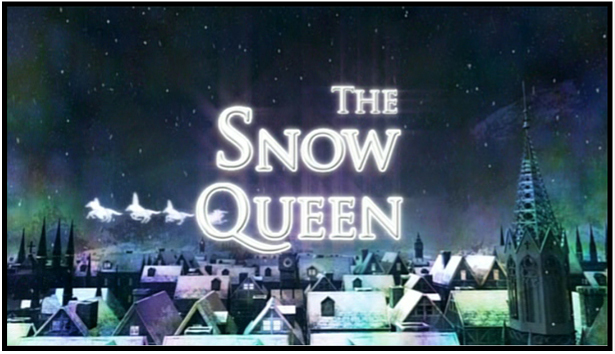 |
In the Korean adaptation of the Hans Christian Andersen fairy tale, Tae Woong's guilt takes on such cosmic proportions that only a similarly sized redemption can save him. Koreans seem to find in this drama a romantic tale of first love and undying friendship. I can't help but feel Tae Woong is walking disaster area, a cyclone in the name of Respect, Politeness and Love. Few people escape his impenetrable self-loathing and come out the other side the better for it. His is an interesting case study of "whatever doesn't kill you makes you stronger." Only the "you" in that adage isn't Tae Woong, it's those around him.
People in Korean TV dramas are forever apologizing. "Biane," they say, repeatedly. And they often leave it at that. The phrase is saturated with sincere regret, but often they fail to add what they're sorry for. Once the formal apology is stated, they await whatever comes. I rather like that excuses are not permitted, but, then, neither are explanations expected. It's all out of extreme politeness – touching, even to cynical Western eyes, but also exasperating. If the offended person does not comment or invite the offender to enlarge on his apology, or if repentant person won't elaborate, it fuels the latter's sense of self-importance, though that is clearly not the intention. In my view it's a recipe for infantalization.
Magical thinkers, children and adults alike, have fantasies of being rescued. The adolescent Tae Woong feels responsible for his friend's death. His sense of guilt is boundless, but he has secret hopes he will be saved from suffering by the right someone. He is not unlike Wagner's Dutchman who comes ashore every several years to seek a woman who will swear fidelity even in the face of death and save him from his eternal wandering. Tae Woong says, "I'm sorry" and walks away – but slowly, hesitating, as if waiting, hoping that he will be engaged in a first step to forgiveness.
I know this man. I have felt him walking in my own shoes years ago. It's hard not to sympathize – up to a point – for Tae Woong doesn't really want anyone to save him. He would rather feel terrible. If someone does reach out, he will refuse to explain himself because it is more important to hold on to his guilt – or, more exactly, his fantasy about guilt - than to accept punishment or whatever else the other might give out – including, most importantly, forgiveness.
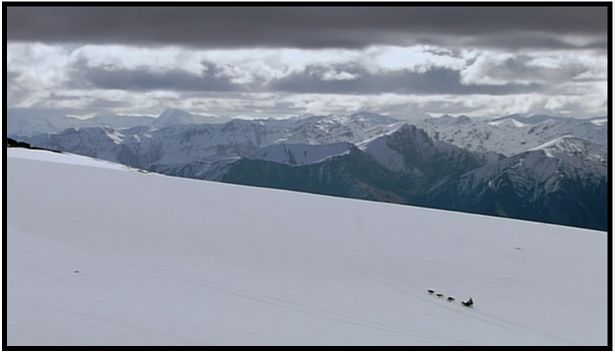 |
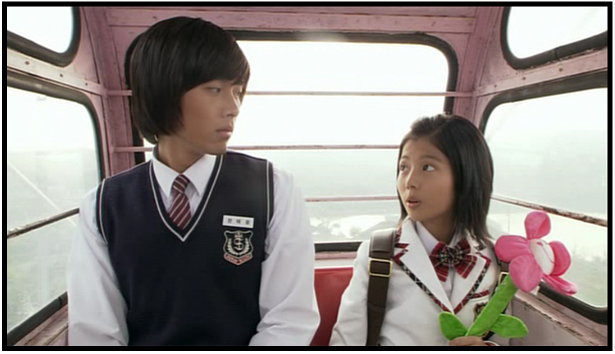 |
[If you haven't seen the series as yet, you might want to skip ahead to the summary of the series, especially as spoilers abound.] Now I don't believe for one minute Koreans feel about Tae Woong the same way I do. I think they see him as heroic, though perhaps foolish: Heroic in that Tae Woong assumes and suffers all pain: he "protects" his friend's sister from reliving her brother's death. Sadly, he misunderstands his role in his friend's suicide. In my admittedly non-Asian view, Tae Woong's attitude and behavior borders on a particularly insidious form of narcissism – in part because we in the audience know that Tae Woong was in no way responsible for Jeong Kyu's suicide. Equally important, Tae Woong isn't just protecting Bo Ra from pain, in his courtesy he protects himself from embarrassment – no small thing in Asian cultures. By keeping his "true" identity secret from her, he ensures that he will be unable to work through his own loss. From his point of view, only he is allowed to suffer, even if in so doing, his misery brings others to the point of death. It's a very twisted pseudo-messianic view of things . . . and it doesn't stop there:
Tae Woong is mistaken in his thinking about Hate. At one point he says to Bo Ra, that he rather she hate him than to suffer – as if hating is something that we do without suffering. Tae Woong hates himself like no one else on Earth, yet he never makes the connection between hating oneself and hating others, and that the cost of hating is the loss of one's soul, no matter who is the object. For all Tae Woong's apparent magnanimity, Bo Ra would lose either way.
Tae Woong has completely bought his own story: that he caused his friend's death and that to confess his identity to Bo Ra would bring about unspeakable pain for her. The truth is that as long as he keeps his identity a secret from her, he gets to wallow in his self-pity. In order to keep his secret, he must repeatedly and transparently lie to Bo Ra that he does not care for her and insults her for caring for him, all of which drives her into a palpable depression. She knows he is lying and, since he evidently doesn't trust her enough to confess the truth, she must face the possibility that her love for him was also false. Tae Woong sees clearly that he is the cause of her present pain, but to prevent the possibility of a different pain by confessing the truth, he hurts her over and over. As he torments himself with heartfelt remorse about the pain he causes her every day, he fantasizes about telling her the truth, but always stops short because it is even more important to maintain his own suffering, his guilt and his sense of importance in his drama. "The pain I am causing her now every day is nothing compared to the pain I would cause her if I told her the truth." How magical is that! His ability to rationalize this is infinite. But Tae Woong is not alone in such thinking. It's like: we should commit more troops so that those who have died will not have died in vain.
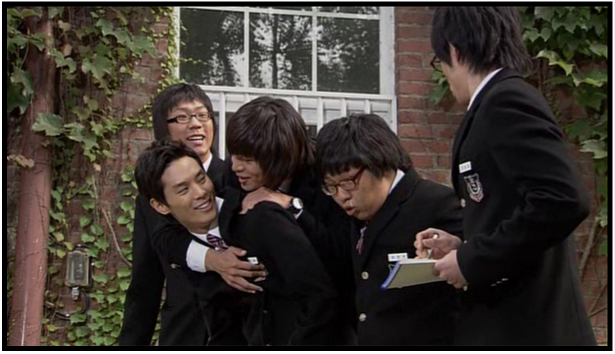 |
What creature is more magical in its thinking than a human infant: anything it does, from crying, to smiling, to crawling, to filling it's diaper gets attention. How could it not believe that the world revolves around him or her, and magically so? A child's natural magical thinking is the mechanism by which guilt works its dark powers. When a child feels angry or expresses rage to its parents, usually the mother, he feels anxious that he may have caused a rift that cannot be healed, but he also feels guilty because he believes that he has inflicted pain of such magnitude that his mother will not be able to forgive him. But mothers generally do understand and forgive – they consider it all part of the landscape.
Tae Woong actually does inflict such pain – both on Bo Ra and on his mother for abandoning her for eight years without even letting her know that he was alive. From his point of view he feels he didn't deserve even a mother's love for having murdered his friend, but he failed to see how much pain his behavior actually caused her. When she does accept him, he is unable to generalize her forgiveness to Bo Ra, which makes us wonder what kind of mother/son relationship he had to begin with. We get an inkling of this when his mother accepts the school's decision that Tae Woong had cheated rather than believe her son that he didn't. I would have liked for the writers to have made something of this but, alas, not.
The producers of this drama make a fundamental mistake in the narrative – whether out of carelessness or only to extend the series, I cannot say. Theirs is not simply a continuity error or an entertaining elaboration of the plot, but what amounts to a serious misunderstanding about the nature of guilt. It is essential to keep in mind that the "fatal" words exchanged between Tae Woong and Jeong Kyu are spoken in private. No one else knew what transpired, nor do they ever find out. If anyone had known, his mother and schoolmates would be all over him with supportive comments like "You are not at fault here." They actually do say that, repeatedly, early on and years later as his secret life starts to unravel - but since they do not really know why Tae Woong feels as he does, their consolation goes for nothing. Tae Woong would be able to say (if he could speak) that they do not understand – and he'd be right. It is not possible, therefore, for Jeong Kyu's father to have heard that "his son's friend was responsible for his death," as he tells his daughter just when things have a shot at working themselves out between Bo Ra and Tae Woong. More than that, if he had heard about it he would have had his people cut Tae Woong into little pieces and fed him to the pigs.
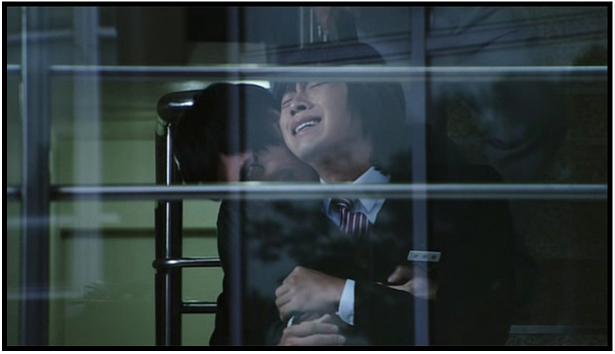 |
It is essential to how guilt works that no one knows why Tae Woong feels as he does. The expression "Confession is good for the soul" is not without basis. Secrecy is a necessary condition for guilt to be effective. It's what psychotherapy is good at relieving (N.B.: The characters in Korean dramas never consider therapy or the church – and for good reason: it helps get the poison out of one's system, and where would our drama be then?) If his friends knew the truth, he would have had to face his role in his friend's death long ago. Tae Woong says nothing because he needs to continue to feel a special intimate connection – as if he had pulled the trigger against his own brother. Jeong Kyu's father - who ought to feel a Raskolnikov's share of guilt himself ("Jeong Kyu, never forget: People only remember the winner") - blames Tae Woong once he learns who he is, and demands that Bo Ra not see him again. His action serves only to prolong the plot rather than to be discerning. Too bad, really. If the writers had remained faithful to the true dynamics of guilt, a rapprochement between Tae Woong and Bo Ra's father could have been just as powerful and more believable – but to do that, they would have had to work out the thread between the father and the wife that left him, and that would have taken the spotlight off Bo-Ra.
Throughout this drama series there is much reference to the same-titled Hans Christian Andersen fairy tale. Tae Woong sees himself as Kay, the young boy who is kidnapped by the Snow Queen, and he sees Bo-Ra as Gerda, the little girl who rescues him. This is an important myth for children as it sets up roles that they act out as they grow older. Many children of either gender never grow out of this, no matter how old or what life experiences present themselves. Tae Woong is one of them as is evident by how deeply he is attached to the story, to his feelings of unworthiness and to being saved by his Gerda. (By the way, in the Andersen story, the Snow Queen herself is a minor character. Even Kay occupies very little of the story's narrative. There is no analogous Snow Queen, as such, in the Korean adaptation.)
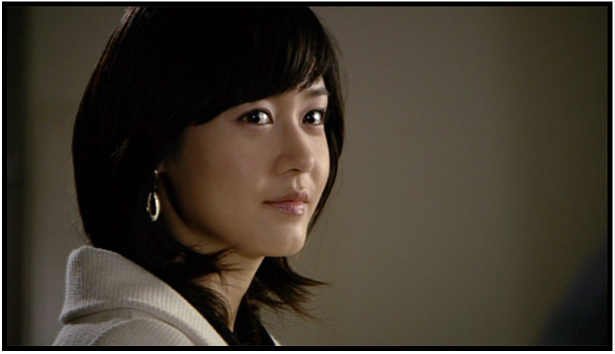 |
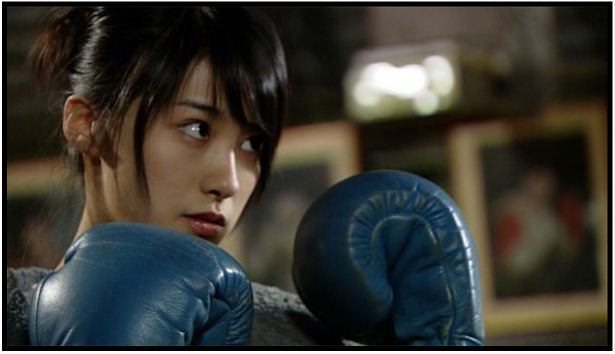 |
In the original fairy tale Kay's heart is turned to ice because of a mischievous sprite (seen by many as Evil incarnate or the Devil), but not because he did anything wrong. Like Tae Woong, Kay's view of everything that was once beautiful to him becomes ugly. Needless to say this frightens Gerda even before the Snow Queen enters the picture, just as it does Bo Ra when Tae Woong treats her with uncharacteristic meanness. Once abducted to Lapland by the Snow Queen, Kay feels no sense of longing, no anxiety or concern about the past or the future - only a vague feeling of suspended animation. Kay is not waiting for rescue for he fails to see that his life is wasting away. It is only Gerda who believes that Kay's soul has been stolen from him. Her search for Kay takes years – all of her childhood, in fact - and once found, her tears wash away the splinters of his frozen heart.
Tae Woong, in his distorted way, is not unlike Kay in that he is oblivious to the reality of his wasted life. On the other hand, Tae Woong feels that he is fundamentally undeserving. He believes he did everything wrong and, to fuel that impression of himself, continues to do so. His whole life seems to him to verify his "sin." But Bo Ra's tears are not enough to save him from himself. For his redemption, he demands the ultimate sacrifice. Unmasked, Tae Woong turns out be, not Kay, but the Dutchman. And Bo Ra is not Gerda, but Senta. Senta cannot help but love the Dutchman, despite Erik, her erstwhile fiance. The story she has heard since childhood about the Dutchman sets her up for the inevitable. Though Tae Woong takes a more active role in the matter, he also takes advantage of Bo Ra's childhood memories of him, for without that early adventure, she would not have loved him later. It is Bo Ra's need to save Tae Woong by remaining true to him, regardless of all she will lose by doing so that nails her as Senta. Furthermore, Gerda is ignorant of how much her search has cost her or the Snow Queen's design, to say nothing of how Kay became infected. Her love of Kay is pure. Senta is fully aware of the Dutchman's satanic baggage; in fact, it is what draws her to him. In the final reels, Bo Ra accepts Tae Woong despite his history with her brother and despite how he has treated her for a dozen or so episodes. She knows what she has to give up to "save" him, and does so willingly.
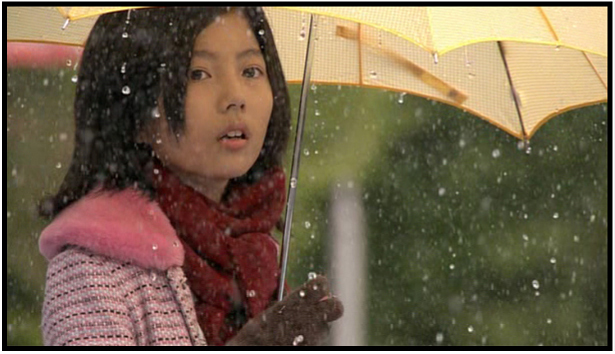 |
For all his self-flagellation, his crying, his protestations of love at the end, Tae Woong is typical of the men we find in Korean and American television dramas: self-righteous, demanding and inflexible. In short: Bobby Ewing. Like Bobby, Tae Woong has a strongly felt feminine side to him with which his masculine side is utterly at odds; and like Bobby, he believes he knows what's best for others as if it is his birthright. At least in Dallas, the women are strong enough to call Bobby on his selfishness. In Korean dramas, it seems that death is the only release for the living. In Dallas, it was all a dream.
The Snow Queen
The Score Card
The Series : 6
The Korean High School of Science is only for the Best of the Best. And the Best of the Freshmen Year of 1998 is universally acknowledged to be Kim Jeong Kyu – that is, until the arrival of mild-mannered Han Tae Woong, who unintentionally unseats the once popular and undisputed king of brains and athlete extraordinaire. Jeong Kyu does not take this challenge lying down, but instead of trying harder (not that it would have made a difference), he deliberately sabotages him, both in class and on the basketball court. One thing leads to another, and after the obligatory exchange of blows, Tae Woong and Jeong Kyu become the Best of Friends, studying and playing feverishly together as they prepare to compete in the International Math Olympics.
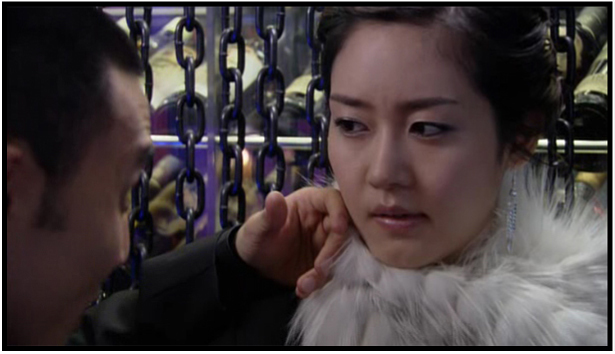 |
Meanwhile, Tae Woong befriends a young girl whom he saves from the taunts and worse of a pack of bigger girls. She is cute, smart and spoiled. Though they meet only twice they begin to form a strong brother/sister relationship. She develops an understandable crush on the older Tae Woong, but fate takes the driver's seat when the results from the Olympics are announced and Jeong Kyu comes in second to Tae Woong. Jeong Kyu's spiteful competitive self returns, goaded by his father's words that no one remembers who came in second. With that, he walks out in front of a truck at the end of the first episode, but not before exchanging regrettable words with Tae Woong about the nature of friendship.
The remainder of The Snow Queen's sixteen episodes takes place eight years later. Tae Woong had left the girl holding her umbrella in the rain, dropped out of school, left town with nary a word, changed his name, and eventually settled down as a sweeper and sparring partner at a second rate boxing club – I like to think so he could get his brains beat out on a regular basis. We soon meet the very rich Bo Ra, who suffers from a serious chronic illness or two that require visits to the hospital now and again, and where she and Tae Woong cross paths. Bo Ra is also consumed with her own variety of self-hate, though in her case she directs her venom at everyone else, seeing herself as victim rather than perpetrator. Tae Woong begins to moonlight as her chauffeur, and can't help notice Ro Ra's self-destructive bent which, as we can well imagine, he goes to great lengths to prevent, even if he himself indulges in it. Over time, their dedication to their respective dysfunctional world views is challenged by the other.
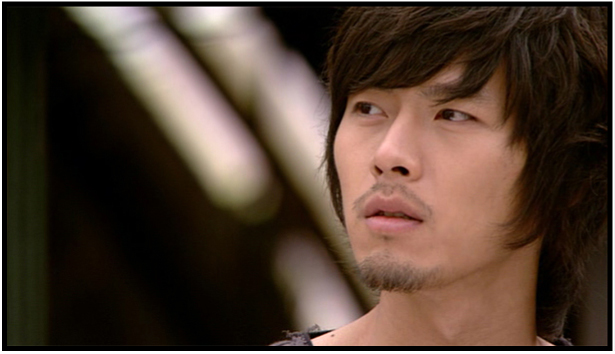 |
Edition: 9
For a change, I know of no other edition, with or without English subtitles. Regardless, this may be YA-Entertainment's best effort so far in presentation and image quality.
Image : 8 (6.5/8)
The score of 8 indicates a relative level of excellence compared to other standard definition DVDs on a 10-point scale for SD DVDs. The score in parentheses represents: first, a value for the image on a 10-point scale that accommodates both standard and high-definition DVDs – where any score above 7 for an SD is outstanding, since the large majority of high definition DVDs are 8-9.5. The second number in parentheses indicates how that image compares to what I believe is the current best we can expect in the theatre or, in the case of made-for-TV fare, as first shown on television, in this case, high definition, which is why a score of 8 and not 10.
While Dae Jang Geum is more breathtaking because of production decisions about lighting, costumes and photography, the image for Snow Queen suffers from fewer jpg artifacts. (The regrettably few scenes in Lapland, by the way, are stunningly photographed.) There are, however, odd motion choices (or problems, I'm not sure which) that occur every now and then (not in Lapland) when things move quickly across the frame: as if the video cadence has suddenly shifted to anime, or frames are dropped to speed up the motion. I suspect the effect is deliberate and is in the original, but I truly do not understand the need for it.
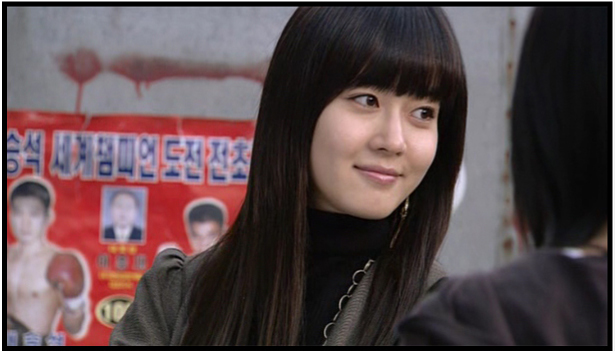 |
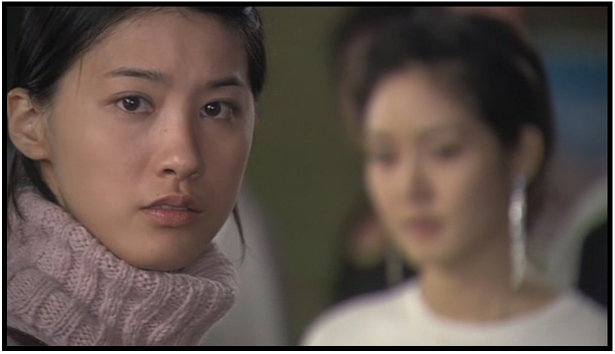 |
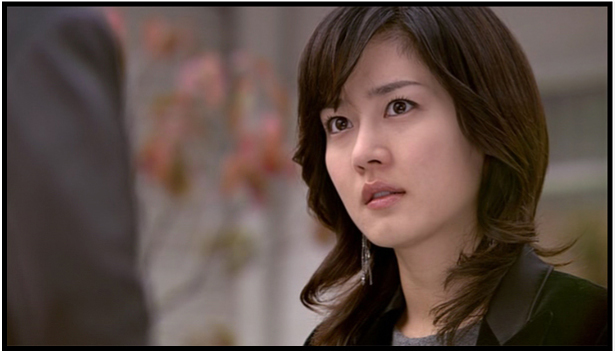 |
Audio & Music : 8/8
As usual with Korean television dramas, the music soundtrack is lovely. Perhaps not quite up to the inspiration or variety of Someday or Winter Sonata, it is nonetheless perfectly suited to the drama at hand. The main theme is particularly affecting: bittersweet, overflowing with nostalgia and regret. Also, as usual with Korean TV dramas, the dialogue is recorded and applied live rather than looped, permitting a more direct experience with the actors.
Translation & Subtitles : 6
The translation is generally fairly good in terms of its being in recognizable idiomatic English and representative of each different character. However, there are some important instances where it is cumbersome or unclear. One occurs in an early episode where Tae Woong explains the sentiment behind his gift of flowers to Bo Ra: "You will unfailingly become happy." Frankly, my dear, I've seen better readings in fortune cookies. But as wince-making as that line is, I might not have taken much notice if it weren't repeated like a leitmotif several times. Later on he holds forth with his philosophy of life: "Even if life is tough, you can't quit. It's good to be alive. Regret some things and get hurt while you live." Again, a difficult read. But under the circumstances Tae Woong is hardly in a position to offer such counsel, nor Bo Ra to accept it. So I suspect that something might be amiss with the translation. I could be wrong. Tae Woong is such a self-righteous character that he could easily overlook how he has lived his own life for the past eight years just so he can offer support to a suffering friend. More subtle is the concept of "liking" someone as opposed to "loving" them. It's hard to expect much sympathy from an English speaking audience when Bo-Ra's father as much as disowns his daughter for announcing that she "likes" Tae Woong. We assume that translation for YAE is a work in progress and, at its eventual best, can never be perfect.
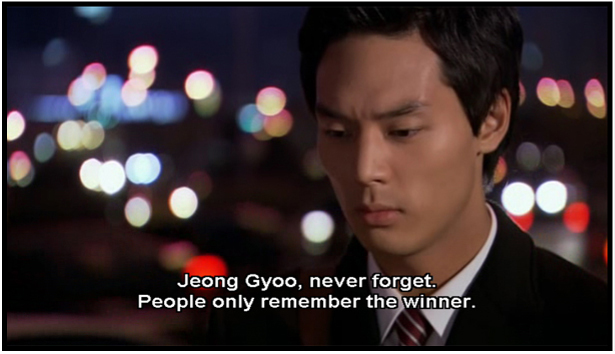 |
Operations & Box Design : 8
I like the magnetic snap case design, permitting the easiest access to the contents of any previous YAE K-drama. However, once opened, it is necessary to expand and lay flat one or the other of two 3-disc inner boxes in order to get to any one of them. I consider this a minor fault, though it's a lot better than having to lay out an entire six-disc set. In the case of TV series, the most sensible solution is slim cases for two discs at a time. I gather that YAE has market-tested this question, and my preference is not in favor.
For some reason, the episodes on the first disc end abruptly into a cheesy framing of a winter scene around previews of the following episode. But beginning with the second disc, all returns to normal.
Extras : 5
Disc six contains the final episode plus about an hour's worth of extra features that include several promo pieces of various lengths, sources and descriptions. These are generally fan-directed, light-hearted looks at the series, its characters and principal actors. For most American and European audiences, I imagine there will be some amusing culture shock at play here. There is also an all too short segment that reviews the locations and the efforts the crew made to modify them or shoot there. I was fascinated to learn that the large expanses of snow and ice, which stand in for Lapland, were photographed in New Zealand. Also included are two short music videos that end abruptly for no apparent reason; one of them, hardly more than a minute, was covered with non-removable logos and titles that appeared all over the image for most of its short life. More peculiar is the fact that both music videos are formatted incorrectly so that everything in them is squashed just enough to notice. I took off an extra two points for these annoyances.
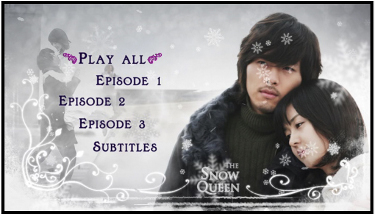 |
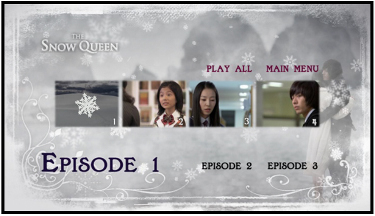 |
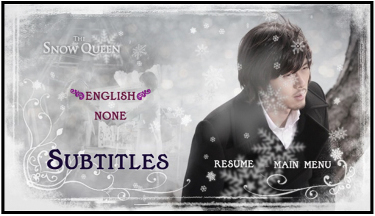 |
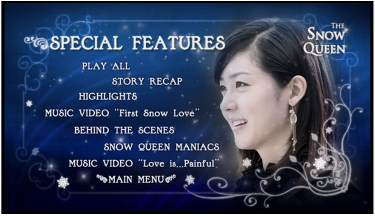 |
|
|
|
Recommendation: 7
Until a few minutes before the end of the first episode I had high hopes for this series. I particularly liked the idea of a competitive friendship between two young men for a change and, together with the presence of the mysterious young girl, seemed to suggest new territory for a Korean TV series. Alas, it was not to be. That said, the performances by all concerned, were terrific, especially Sung Yu Ri who got to do more than sulk and cry (which Hyun Bin was very good at, by the way, as he was completely convincing as a seventeen year old.) Of the supporting actors I would single out Lee Sun Ho as Kim Jeong Kyu, Go Ju Yun as the young girl from episode one and Yoo In Young as the very sympathetic Lee Seoung Ri, who loves Tae Woong unrequitedly in his guise as a sparring partner.
Leonard Norwitz
LensViews
December 28th, 2007
Thinking of buying from
YesAsia?
CLICK HERE and use
THIS UPDATED BEAVER PAGE to source their
very best...
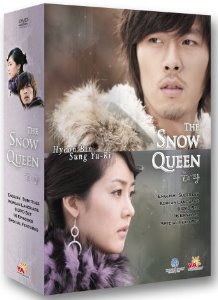
WINNER: Steve B or Durham, NC
GOOD LUCK ALL!

